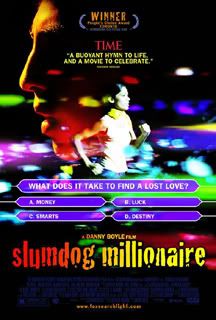 "Slumdog Millionaire" is a poor boy's tale -- a kid from the Mumbai slums who ends up competing on a top game show for millions of dollars, but who in his heart just wants the love of a girl.
"Slumdog Millionaire" is a poor boy's tale -- a kid from the Mumbai slums who ends up competing on a top game show for millions of dollars, but who in his heart just wants the love of a girl. I really dug it -- I haven't seen enough of 2008's "big" movies to say whether it's the best or if it deserves that Oscar win for Best Picture, but I wouldn't be sad if it did win. It's a vibrant, dynamic flick, utilizing the best of hyperkinetic director Danny Boyle's style that he's developed in films like "Trainspotting," "28 Days Later" and the underrated "Sunshine." It's got great heart, a terrific fusion soundtrack, a frenetic but not overwrought editing sensibility and colour, and offers most of us in the West a view into a world we can hardly imagine. It's a dash of Bollywood crossed with Charles Dickens, romantic comedy and police thriller. But it's also getting a fair amount of attacks as well.
The biggest complaint or backlash against the movie seems to be how it portrays India's poor, and if it's "glorifying" them or using real human suffering as the basis for entertainment. It's an argument, sure, but I really have a problem seeing how valid it is when poverty and suffering have been the basis of entertainment for a hell of a long time. Heck, just in the last few years off the top of my head movies like "Gangs of New York," "Brokeback Mountain," "Crash," "Babel," "No Country For Old Men" and "Ray" have all used some variation on the theme of poor people living miserable lives, faced with choices on how to get out. I really, really hate the term "political correctness," which has come to mean less than nothing really, but in this case, you have to wonder -- if Danny Boyle wasn't a British white guy, would his film be getting the same charges of exploitation? Maybe so.
 But I just don't think "Slumdog" glorifies poverty -- good lord, just seeing what Jamal goes through at the hands of the beggar leader Maman is enough to turn me off the idea of being poor. "Slumdog" is uplifting, and a bit sentimental and yeah, blatantly implausible in a lot of ways, but in the end it does offer a message of hope in the darkness, of getting out and breaking free of your circumstances (or, as Jamal would have it, instead, finding your true self -- "It is written," after all). It is a fantasy of the possible, like a lot of great flicks.
But I just don't think "Slumdog" glorifies poverty -- good lord, just seeing what Jamal goes through at the hands of the beggar leader Maman is enough to turn me off the idea of being poor. "Slumdog" is uplifting, and a bit sentimental and yeah, blatantly implausible in a lot of ways, but in the end it does offer a message of hope in the darkness, of getting out and breaking free of your circumstances (or, as Jamal would have it, instead, finding your true self -- "It is written," after all). It is a fantasy of the possible, like a lot of great flicks. If that kind of storytelling is somehow wrong, then a lot of movies are too. Whether the subjects are white, brown, black or whatever shouldn't matter if the story is worth telling. Boyle and company haven't set out to document every facet of the awful reality of the underclass in so much of the non-western world. This is not a documentary. It's a movie, and a fine one.

No comments:
Post a Comment